|
Books Should Be Free Loyal Books Free Public Domain Audiobooks & eBook Downloads |
|
|
Books Should Be Free Loyal Books Free Public Domain Audiobooks & eBook Downloads |
|
Poetry |
|---|
|
Book type:
Sort by:
View by:
|
By: Bret Harte (1836-1902) | |
|---|---|
 Excelsior
Excelsior
| |
 Society Upon The Stanislaus
Society Upon The Stanislaus
volunteers bring you 12 recordings of The Society Upon The Stanislaus by Bret Harte. This was the Fortnightly Poetry project for January 24, 2021. ------ Taken from Little Masterpieces of American Wit and Humor, Volume II by Thomas L. Masson - Summary by David Lawrence | |
By: Brontë sisters | |
|---|---|
 Selected Poems by Currer, Ellis and Acton Bell
Selected Poems by Currer, Ellis and Acton Bell
Poems by Currer, Ellis and Acton Bell was a volume of poetry published jointly by the three Bronte sisters, Charlotte, Emily and Anne in 1846, and their first work to ever go in print. To evade contemporary prejudice against female writers, the Bronte sisters adopted androgynous first names. Marked by profound sentiments, gravity and melodious harmony, the poems are strewn on the fields of soulful love, rueful reminiscence and the immortal yearnings of a Christian soul, and represent a fragrant assemblage of noetic flowers from the glebes of olden England... | |
By: BS Murthy | |
|---|---|
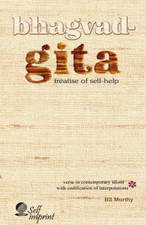 Bhagvad-Gita: Treatise of Self-help
Bhagvad-Gita: Treatise of Self-help
The spiritual ethos and the philosophical outlook that the Bhagvad - Gita postulates paves the way for the liberation of man, who, as Rousseau said, ‘being born free, is everywhere in chains’. But equally it is a mirror of human psychology, which enables man to discern his debilities for appropriate redressal. All the same, the boon of an oral tradition that kept it alive for over two millennia became its bane with the proliferation of interpolations therein. Besides muddying its pristine philosophy, these insertions affect the sequential conformity and structural economy of the grand discourse... | |
By: Burton Egbert Stevenson (1872-1962) | |
|---|---|
 The Home Book of Verse
The Home Book of Verse
| |
By: C. J. Dennis (1876-1938) | |
|---|---|
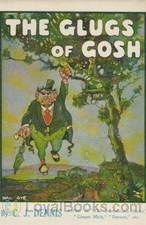 The Glugs of Gosh
The Glugs of Gosh
First published in 1917, The Glugs of Gosh satirizes Australian life at the start of the twentieth century – but the absurdities it catalogs seem just as prevalent at the start of the twenty-first. The foolishness of kings, the arrogance of the elite, the gullibility of crowds, the pride of the self-righteous, the unthinking following of tradition – all find themselves the targets of C. J. Dennis’ biting wit. | |
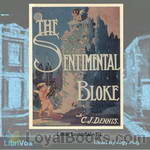 The Songs of a Sentimental Bloke
The Songs of a Sentimental Bloke
The Songs of a Sentimental Bloke is a verse novel by Australian novelist and poet C. J. Dennis. The book sold over 60,000 copies in nine editions within the first year, and is probably one of the highest selling verse novels ever published in Australia.The novel tells the story of Bill, a larrikin of the Little Lonsdale Street Push, who is introduced to a young woman by the name of Doreen. The book chronicles their courtship and marriage, detailing Bill’s transformation from a violence-prone gang member to a contented husband and father. C.J. Dennis went on to publish three sequels to this novel: The Moods of Ginger Mick (1916), Doreen (1917) and Rose of Spadgers (1924) | |
 Digger Smith
Digger Smith
“Digger Smith” is a series of narrative poems about an Australian soldier coming home in the closing months of the Great War minus a leg and with “ANZAC eyes” ... what a later war would call “The Thousand Yard Stare”. Despite his post-traumatic stress disorder, Digger Smith sets about ministering to everybody’s troubles but his own ... his internal conviction that his amputee status will make him seem “half a man” in the eyes of the lady love he left behind when he went off to the War. Oh Digger Smith, how little faith you have in woman... - Summary by Son of the Exiles | |
By: C. S. Lewis (1898-1963) | |
|---|---|
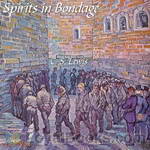 Spirits in Bondage: a cycle of lyrics
Spirits in Bondage: a cycle of lyrics
First published in 1919 under his pseudonym Clive Hamilton, Spirits in Bondage, is also the first published book by the notorious novelist C.S. Lewis. This early piece of work represents Lewis’ youth, as it was written at a time when the author had just returned from his military service in the First World War. In addition it differentiates itself from his other works, not just in terms of style, but also in themes due to his agnostic stand at the time. Written in the form of poetry, the piece is divided into three sections of poetry, each intended to be read in chronological order to gain complete access to its themes and ideas... | |
By: Cale Young Rice (1872-1943) | |
|---|---|
 Nirvana Days
Nirvana Days
| |
By: Carolyn Wells (1862-1942) | |
|---|---|
 The Jingle Book
The Jingle Book
A collection of silly poetry and limericks for children. | |
 Children of Our Town
Children of Our Town
| |
By: Catherine Ann Turner Dorset (1750?-1817?) | |
|---|---|
 The Peacock 'At Home:' A Sequel to the Butterfly's Ball
The Peacock 'At Home:' A Sequel to the Butterfly's Ball
| |
By: Charles A. Gunnison (1861-1897) | |
|---|---|
 In Macao
In Macao
| |
By: Charles George Douglas Roberts (1860-1943) | |
|---|---|
 In Divers Tones
In Divers Tones
| |
By: Charles Godfrey Leland (1824-1903) | |
|---|---|
 Hans Breitman's ballads
Hans Breitman's ballads
| |
 Songs of the Sea and Lays of the Land
Songs of the Sea and Lays of the Land
This is a volume of poetry by Charles Godfrey Leland. The first half of this volume is taken up by the Songs of the Sea, with rather romantic songs about seafaring, mermaids, and adventures, and the second half of the volume contains the Lays of the Land, with poems focused on the things a seaman may encounter when he enters a port. - Summary by Carolin | |
By: Charles H. Bennett (1829-1867) | |
|---|---|
 The Nine Lives of A Cat A Tale of Wonder
The Nine Lives of A Cat A Tale of Wonder
| |
By: Charles Knight (1791-1873) | |
|---|---|
 Mind Amongst the Spindles
Mind Amongst the Spindles
Lowell Massachusetts was founded in the 1820s as a planned manufacturing center for textiles and is located along the rapids of the Merrimack River, 25 miles northwest of Boston. By the 1850s Lowell had the largest industrial complex in the United States. The textile industry wove cotton produced in the South. In 1860, there were more cotton spindles in Lowell than in all eleven states combined that would form the Confederacy. Mind Amongst the Spindles is a selection of works from the Lowell Offering, a monthly periodical collecting contributed works of poetry and fiction by the female workers of the textile mills... | |
By: Charles Moreton | |
|---|---|
 The Maid and the Magpie An Interesting Tale Founded on Facts
The Maid and the Magpie An Interesting Tale Founded on Facts
| |
By: Charles Rogers (1825-1890) | |
|---|---|
 Modern Scottish Minstrel
Modern Scottish Minstrel
Subtitled "Songs of Scotland of the Past Half-Century, with Memoirs of the Poets, and Sketches and Specimens in English Verse of the Most Celebrated Modern Gaelic Bards." | |
 The Modern Scottish Minstrel, Volume I. The Songs of Scotland of the past half century
The Modern Scottish Minstrel, Volume I. The Songs of Scotland of the past half century
| |
 The Modern Scottish Minstrel, Volume IV. The Songs of Scotland of the Past Half Century
The Modern Scottish Minstrel, Volume IV. The Songs of Scotland of the Past Half Century
| |
 The Modern Scottish Minstrel, Volume V. The Songs of Scotland of the Past Half Century
The Modern Scottish Minstrel, Volume V. The Songs of Scotland of the Past Half Century
| |
 The Modern Scottish Minstrel, Volume VI The Songs of Scotland of the Past Half Century
The Modern Scottish Minstrel, Volume VI The Songs of Scotland of the Past Half Century
| |
 The Modern Scottish Minstrel, Volume II. The Songs of Scotland of the past half century
The Modern Scottish Minstrel, Volume II. The Songs of Scotland of the past half century
| |
 The Modern Scottish Minstrel, Volume III The Songs of Scotland of the Past Half Century
The Modern Scottish Minstrel, Volume III The Songs of Scotland of the Past Half Century
| |
By: Charles William Eliot (1834-1926) | |
|---|---|
 The Harvard Classics, Volume 49, Epic and Saga With Introductions And Notes
The Harvard Classics, Volume 49, Epic and Saga With Introductions And Notes
MANUAL OF SURGERY, OXFORD MEDICAL PUBLICATIONSBY ALEXIS THOMSON, F.R.C.S.Ed.PREFACE TO SIXTH EDITION Much has happened since this Manual was last revised, and many surgical lessons have been learned in the hard school of war. Some may yet have to be unlearned, and others have but little bearing on the problems presented to the civilian surgeon. Save in its broadest principles, the surgery of warfare is a thing apart from the general surgery of civil life, and the exhaustive literature now available on every aspect of it makes it unnecessary that it should receive detailed consideration in a manual for students... | |
By: Charlotte Perkins Gilman (1860-1935) | |
|---|---|
 Suffrage Songs and Verses
Suffrage Songs and Verses
Charlotte Perkins Gilman, one of the most prominent American suffragists, was not only known as an accomplished author of fiction and non-fiction, but also her poetry remains worth reading until today. - Summary by Carolin | |
By: Chauncey Brewster Tinker (1876-1963) | |
|---|---|
 The Translations of Beowulf A Critical Bibliography
The Translations of Beowulf A Critical Bibliography
| |
By: Chretien de Troyes | |
|---|---|
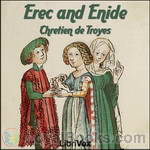 Erec and Enide
Erec and Enide
A medieval romance in which Erec goes through many trials until he is sure of Enide’s loyalty and true love | |
By: Christina Georgina Rossetti (1830-1894) | |
|---|---|
 Goblin Market, The Prince's Progress, and Other Poems
Goblin Market, The Prince's Progress, and Other Poems
| |
By: Christina Rossetti (1830-1894) | |
|---|---|
 Long Ago
Long Ago
LibriVox volunteers bring you 12 recordings of Long Ago by Christina G. Rossetti. This was the Weekly Poetry project for December 9, 2012.Christina Georgina Rossetti (5 December 1830 – 29 December 1894) was an English poet who wrote a variety of romantic, devotional, and children's poems. She is perhaps best known for her long poem Goblin Market, her love poem Remember, and for the words of the Christmas carol In the Bleak Midwinter. | |
By: Christopher Marlowe (1564-1593) | |
|---|---|
 Hero and Leander
Hero and Leander
“Who ever lov’d, that lov’d not at first sight?” The wonder-decade of the English drama was suddenly interrupted in 1592, when serious plague broke out in London, forcing the closure of the theatres. Leading playwrights took to penning languorously erotic poetry to make ends meet: so we have Venus and Adonis, The Rape of Lucrece - and Marlowe’s blazing masterpiece, Hero and Leander. Marlowe’s poem became more notorious than either of Shakespeare’s, due not only to its homophile provocations but also to the scandal attaching to every aspect of Marlowe’s brief life, violently ended in a mysterious brawl, leaving the poem in an unfinished state... | |
 The Works of Christopher Marlowe, Vol. 3 (of 3)
The Works of Christopher Marlowe, Vol. 3 (of 3)
| |
By: Christopher Morley (1890-1957) | |
|---|---|
 Mince Pie
Mince Pie
Mince Pie is a compilation of humorous sketches, poetry, and essays written by Christopher Morley. Morley sets the tone in the preface: "If one asks what excuse there can be for prolonging the existence of these trifles, my answer is that there is no excuse. But a copy on the bedside shelf may possibly pave the way to easy slumber. Only a mind "debauched by learning" (in Doctor Johnson's phrase) will scrutinize them too anxiously." | |
 Songs for a Little House
Songs for a Little House
| |
By: Clara M. Beede | |
|---|---|
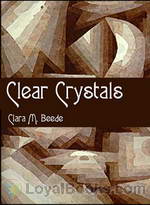 Clear Crystals
Clear Crystals
Book of 31 short poems dedicated to Soldierboys. | |
By: Clinton Scollard (1860-1932) | |
|---|---|
 Sprays of Shamrock
Sprays of Shamrock
| |
By: Conrad Aiken (1889-1973) | |
|---|---|
 American Poetry, 1922 A Miscellany
American Poetry, 1922 A Miscellany
| |
 House of Dust: A Symphony
House of Dust: A Symphony
The House of Dust is a poem written in the four-movement format of a classical symphony. Hauntingly beautiful despite its bleak post-World War I depictions of human mortality and loss, the poem develops its movements around central images such as Japanese ukiyo-e ("floating world") woodblock prints, touching the reader's senses with endlessly evocative allusions to wind, sea, and weather. In this underlying Japanese sensibility and dependence on central perceptual images, Aiken's poem is similar to poetry of Imagists of the time such as Amy Lowell. Also deeply influenced by the concepts of modern psychology, Aiken delved deeply into individual human identity and emotion. | |
By: Cordenio A. Severance (1863?-1925) | |
|---|---|
 Indian Legends of Minnesota
Indian Legends of Minnesota
| |
By: Coventry Kersey Dighton Patmore (1823-1896) | |
|---|---|
 Angel in the House
Angel in the House
| |
 Victories of Love
Victories of Love
| |
 The Children's Garland from the Best Poets
The Children's Garland from the Best Poets
| |
By: D. H. Lawrence (1885-1930) | |
|---|---|
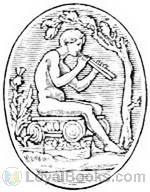 Ballad of Another Ophelia
Ballad of Another Ophelia
LibriVox volunteers bring you 16 recordings of the haunting Ballad of Another Ophelia by D. H. Lawrence. This was the Fortnightly Poetry project for March 24, 2013. | |
 Look! We Have Come Through!
Look! We Have Come Through!
| |
 New Poems
New Poems
| |
 Bay A Book of Poems
Bay A Book of Poems
| |
 Love Poems and Others
Love Poems and Others
This is a collection of poems by DH Lawrence. Most of the poems concern love and neighboring emotions, but some poems also concern other themes. - Summary by Carolin | |
By: Daniel Bussier Shumway (1868-) | |
|---|---|
 The Nibelungenlied
The Nibelungenlied
| |
By: Dante Alighieri (1265-1321) | |
|---|---|
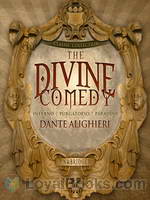 The Divine Comedy
The Divine Comedy
The Divine Comedy (Italian: Commedia, later christened “Divina” by Giovanni Boccaccio), written by Dante Alighieri between 1308 and his death in 1321, is widely considered the central epic poem of Italian literature, the last great work of literature of the Middle Ages and the first great work of the Renaissance. A culmination of the medieval world-view of the afterlife, it establishes the Tuscan dialect in which it is written as the Italian standard, and is seen as one of the greatest works of world literature... | |
By: Dante Gabriel Rossetti (1828-1882) | |
|---|---|
 The House of Life
The House of Life
| |
By: David Lester Richardson (1801-1865) | |
|---|---|
 Flowers and Flower-Gardens With an Appendix of Practical Instructions and Useful Information Respecting the Anglo-Indian Flower-Garden
Flowers and Flower-Gardens With an Appendix of Practical Instructions and Useful Information Respecting the Anglo-Indian Flower-Garden
| |
By: David Morton (1886-1957) | |
|---|---|
 Ships in Harbour
Ships in Harbour
| |
By: David Rorie (1867-1946) | |
|---|---|
 The Auld Doctor and other Poems and Songs in Scots
The Auld Doctor and other Poems and Songs in Scots
| |
By: Don Marquis (1878-1937) | |
|---|---|
 Dreams and Dust
Dreams and Dust
| |
By: Dorothy Parker (1893-1967) | |
|---|---|
 Men I'm Not Married To
Men I'm Not Married To
A saucy little poem commenting upon all men that Ms. Parker didn't marry, perhaps implying that upon marrying, the husband becomes far more special than all the other men in the world. It's sort of the same theme embodied in Saint-Exupéry's The Little Prince, who was saddened to discover that his rose was like any other rose, except when he further realized that his rose depended upon him alone for her care, and was the only rose that belonged to him. ~ Summary by Michele Fry | |
By: DuBose Heyward (1885-1940) | |
|---|---|
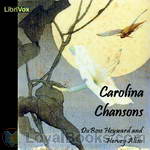 Carolina Chansons: Legends of the Low Country
Carolina Chansons: Legends of the Low Country
This is a collection of poems about Charleston and the South Carolina Lowcountry. DuBose Heyward was a Charleston native best known for his novel Porgy, which was the basis for the Gershwin opera Porgy and Bess. Hervey Allen, who later wrote Anthony Adverse, met Heyward after moving to Charleston to teach. Together they founded the Poetry Society of South Carolina, which is still active today. | |
By: Duncan Campbell Scott (1862-1947) | |
|---|---|
 Lundy's Lane and Other Poems
Lundy's Lane and Other Poems
| |
 End Of The Day
End Of The Day
volunteers bring you 13 recordings of The End Of The Day by Duncan Campbell Scott. This was the Weekly Poetry project for February 23, 2020. ------ Duncan Campbell Scott CMG FRSC was a Canadian bureaucrat, poet and prose writer. With Charles G.D. Roberts, Bliss Carman, and Archibald Lampman, he is classed as one of Canada's Confederation Poets. - Summary by Wikipedia | |
By: E. Phillips | |
|---|---|
 Sweets for Leisure Hours Amusing Tales for Little Readers
Sweets for Leisure Hours Amusing Tales for Little Readers
| |
By: Ebenezer Cooke (1667?-1732?) | |
|---|---|
 The Sot-weed Factor: or, A Voyage to Maryland. A Satyr.In which is Describ'd The Laws, Government, Courts and Constitutions of the Country
The Sot-weed Factor: or, A Voyage to Maryland. A Satyr.In which is Describ'd The Laws, Government, Courts and Constitutions of the Country
| |
By: Edgar A. Guest (1881-1959) | |
|---|---|
 All That Matters
All That Matters
A collection of poems about life. Written in an easy and interesting style this book includes poems about many parts of family life, motherhood, babies, dads, and youth. None of them long, they focus the listener on the blessings of life. | |
 A Heap O' Livin'
A Heap O' Livin'
| |
 Just Folks
Just Folks
| |
 Over Here
Over Here
| |
By: Edgar Allan Poe (1809-1849) | |
|---|---|
 The Raven
The Raven
When a modern film script draws inspiration from a poem written more than a century ago, readers can judge its impact on our collective imagination. Such is the resonance of the poem "The Raven" by Edgar Allan Poe. First published in 1845, "The Raven" is a masterpiece of atmosphere, rhythmic quality and use of language. Constructed in narrative form, it tells the story of a young man who is mourning the loss of his beloved. One December night as he wearily sits up browsing through a classical volume, a mysterious tapping against his window disturbs him... | |
 Collection of Edgar Allan Poe
Collection of Edgar Allan Poe
| |
 Raven and Other Poems
Raven and Other Poems
"Once upon a midnight dreary, while I pondered, weak and weary, Over many a quaint and curious volume of forgotten lore—While I nodded, nearly napping, suddenly there came a tapping, As of some one gently rapping — rapping at my chamber door. "Tis some visitor," I muttered, "tapping at my chamber door — Only this and nothing more."". Those sonorous and somber words of Edgar Allan Poe that begin The Raven are part of most everyone's fond educational memories. Beautiful and haunting to hear and even more fun to read aloud... | |
 Bells and Other Poems
Bells and Other Poems
This is a collection of the most famous poems by Edgar Allan Poe. It includes all of his most famous poems, such as the Bells and Annabel Lee, but also some minor and less well-known poems. Readers may wish to refer to the online text for 28 beautiful colour illustrations by Edmund Dulac. - Summary by Carolin | |
By: Edgar Lee Masters (1868-1950) | |
|---|---|
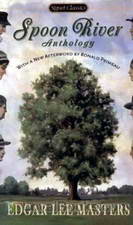 Spoon River Anthology
Spoon River Anthology
Two hundred and twelve residents of a small town tell their stories without fear of recrimination or ridicule. The only difference is that they're all dead! The two hundred and forty-four poems that form the Spoon River Anthology by Edgar Lee Masters is really a series of epitaphs about the citizens of a fictional town called Spoon River and deals with the “plain and simple annals” of small town America. Edgar Lee Masters grew up in a small town in Illinois. His father's financial problems forced the young Masters to abandon ideas of college and take up a job instead... | |
By: Edith Nesbit (1858-1924) | |
|---|---|
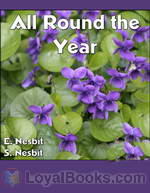 All Round the Year
All Round the Year
A light and whimsical collection of poems by the celebrated children’s author E Nesbit, in collaboration with Saretta Nesbit. | |
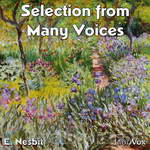 Many Voices (selection from)
Many Voices (selection from)
E. Nesbit (Edith Bland) was a prodigious 19th century children’s writer who produced over 60 books of fiction for children. This book of poems has many elements which would appeal to children but there’s also some exploration of her feelings of love, lust and longing which your average 10 year old would find downright yucky. There are also moments of joy, moments of sugary sweetness and moments of sharp insight in this collection which contains views from many angles. Recurring themes of love, death, gardens and fairies give us a fine insight into the lively imagination of E. Nesbit. Summary by Jim Mowatt. | |
 Rainbow and the Rose
Rainbow and the Rose
A collection of poetry in the whimsical style of Edith Nesbit, author of "The Five Children and It" and "The Railway Children". These poems are primarily for adults, although a few are written for her daughters. The majority are philosophical reflections on Edith Nesbit's life as a wife and mother, and theological reflections on Christianity and faith, the nature of the world, life and death. | |
By: Edith Wharton (1862-1937) | |
|---|---|
 Artemis to Actaeon, and Other Verses
Artemis to Actaeon, and Other Verses
| |
By: Edmund Goldsmid | |
|---|---|
 Quaint Gleanings from Ancient Poetry
Quaint Gleanings from Ancient Poetry
| |
By: Edmund Gosse (1849-1928) | |
|---|---|
 Victorian Songs Lyrics of the Affections and Nature
Victorian Songs Lyrics of the Affections and Nature
| |
 Some Diversions of a Man of Letters
Some Diversions of a Man of Letters
| |
By: Edna St. Vincent Millay (1892-1950) | |
|---|---|
 A Few Figs from Thistles
A Few Figs from Thistles
A collection of 23 poems by Edna St. Vincent Millay. | |
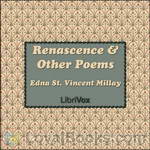 Renascence and Other Poems
Renascence and Other Poems
The following is a recording of the first volume of poetry published by Edna St. Vincent Millay. When the author had graduated from high school, she couldn’t afford to go to college. In the summer of 1912, Vincent’s sister, Norma, found work as a waitress at a hotel near where they lived. One night, Norma insisted that Vincent attend a masquerade ball, given at the hotel, if only to get Vincent out of the house and to meet people. Vincent finally gave in, and while there, sang songs and recited “Renascence,” the first poem in this collection... | |
 Second April
Second April
A collection of poems by Edna St. Vincent Millay. | |
 Harp-Weaver, and Other Poems
Harp-Weaver, and Other Poems
Although Edna St. Vincent Millay was gaining recognition for her lyrical poems since 1920, it was winning the Pulitzer Prize for Poetry in 1923 for "The Ballad of the Harp-Weaver" that established her career as a poet. In 1943, Millay was the sixth person and the second woman to be awarded the Frost Medal for her lifetime contribution to American poetry. - Summary by AnnaLisa Bodtker | |
By: Edward Burrough Brownlow (1857-1895) | |
|---|---|
 Orpheus and Other Poems
Orpheus and Other Poems
This is a volume of poetry by the rather obscure Canadian poet Edward Burrough Brownlow, published posthumously after his death in 1896. The poems in this volume have varied subjects, reflecting the interests of the poet. - Summary by Carolin | |
By: Edward Doyle (1854-) | |
|---|---|
 Freedom, Truth and Beauty Sonnets
Freedom, Truth and Beauty Sonnets
| |
By: Edward Dyson (1865-1931) | |
|---|---|
 'Hello, Soldier!' Khaki Verse
'Hello, Soldier!' Khaki Verse
| |
By: Edward Lear (1812-1888) | |
|---|---|
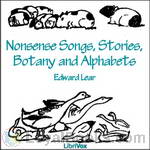 Nonsense Songs, Stories, Botany and Alphabets
Nonsense Songs, Stories, Botany and Alphabets
A selection of nonsense poems, songs (not sung!), stories, and miscellaneous strangeness. The work includes the "Owl and the Pussycat" and a recipe for Amblongus Pie, which begins "Take 4 pounds (say 4½ pounds) of fresh ablongusses and put them in a small pipkin."Edward Lear was an English writer, poet, cat-lover, and illustrator (his watercolours are beautiful). This recording celebrates the 200th anniversary of Lear's birth. | |
By: Edward Smyth Jones (1881-) | |
|---|---|
 The Sylvan Cabin A Centenary Ode on the Birth of Lincoln and Other Verse
The Sylvan Cabin A Centenary Ode on the Birth of Lincoln and Other Verse
| |
 Flag of the Free
Flag of the Free
| |
By: Edward Thomas (1878-1917) | |
|---|---|
 Last Poems
Last Poems
| |
By: Edward Woodley Bowling (1837-1907) | |
|---|---|
 Climber's Dream
Climber's Dream
Edward Woodley Bowling was apparently a rector at the Church of All Saints in Houghton Conquest, Bedfordshire, England in the late 1800's, this poem is taken from Sagittulae, Random Verses. In this book's introduction he writes "The general reader will probably think that some apology is due to him from me for publishing verses of so crude and trivial a character. I can only say that the smallest of bows should sometimes be unstrung, and that if my little arrows are flimsy and light they will, I trust, wound no one." | |
By: Edward Young (1683-1765) | |
|---|---|
 The Poetical Works of Edward Young, Volume 2
The Poetical Works of Edward Young, Volume 2
MANUAL OF SURGERY, OXFORD MEDICAL PUBLICATIONSBY ALEXIS THOMSON, F.R.C.S.Ed.PREFACE TO SIXTH EDITION Much has happened since this Manual was last revised, and many surgical lessons have been learned in the hard school of war. Some may yet have to be unlearned, and others have but little bearing on the problems presented to the civilian surgeon. Save in its broadest principles, the surgery of warfare is a thing apart from the general surgery of civil life, and the exhaustive literature now available on every aspect of it makes it unnecessary that it should receive detailed consideration in a manual for students... | |
By: Edward Ziegler Davis (1878-1924) | |
|---|---|
 Translations of German Poetry in American Magazines 1741-1810
Translations of German Poetry in American Magazines 1741-1810
| |
By: Edwin Arlington Robinson (1869-1935) | |
|---|---|
 Man Against the Sky: A Book of Poems
Man Against the Sky: A Book of Poems
This is a volume of later Poetry by the famous American poet Edwin Arlington Robinson. | |
 Three Taverns: A Book of Poems
Three Taverns: A Book of Poems
This is a volume of poems by Edwin Arlington Robinson. This volume contains, among other poems, the famous poems The Valley of the Shadow and Lazarus. | |
By: Edwin Arnold (1832-1904) | |
|---|---|
 Indian Poetry Containing "The Indian Song of Songs,"
Indian Poetry Containing "The Indian Song of Songs,"
| |
By: Effie Afton (1829-1887) | |
|---|---|
 Eventide A Series of Tales and Poems
Eventide A Series of Tales and Poems
| |
By: Effie Waller Smith (1879-1960) | |
|---|---|
 Rosemary and Pansies
Rosemary and Pansies
Effie Waller Smith was recognized as a promising young black poet. Her poems reflect her love of nature, her faith, and her experience as a black woman in Appalachia. Although she only published three volumes of poetry during her lifetime, the poems are as relevant today as when first published. Perhaps she is best described in this poem by Peter Clay: "To Effie Waller. Far upon among the mountains, Where rivers leave their fountains, And happy birds send forth their merry thrills, There dwells a little poet, Though few there be who know it, Whose voice is an echo from the hills." | |
By: Eleanor H. Porter (1868-1920) | |
|---|---|
 Mary Marie
Mary Marie
A charming 'coming of age' story about a young girl, Mary Marie, whose young life is thrown into turmoil as her parents divorce. As she leads two lives, she comes to realize that her parents still love one another, and engineers a reunion. In the end, we discover the long-lasting effect of this turmoil on the adult Mary Marie, and her own marriage." | |
By: Eleanor L. Skinner | |
|---|---|
 Topaz Story Book: Stories and Legends of Autumn, Hallowe'en, and Thanksgiving
Topaz Story Book: Stories and Legends of Autumn, Hallowe'en, and Thanksgiving
From the Introduction: "Nature stories, legends, and poems appeal to the young reader’s interest in various ways. Some of them suggest or reveal certain facts which stimulate a spirit of investigation and attract the child’s attention to the beauty and mystery of the world. Others serve an excellent purpose by quickening his sense of humour." This is a charming collection of stories, legends, and poems about autumn harvest, Halloween, and Thanksgiving translated from the Danish, French, German, and others... | |